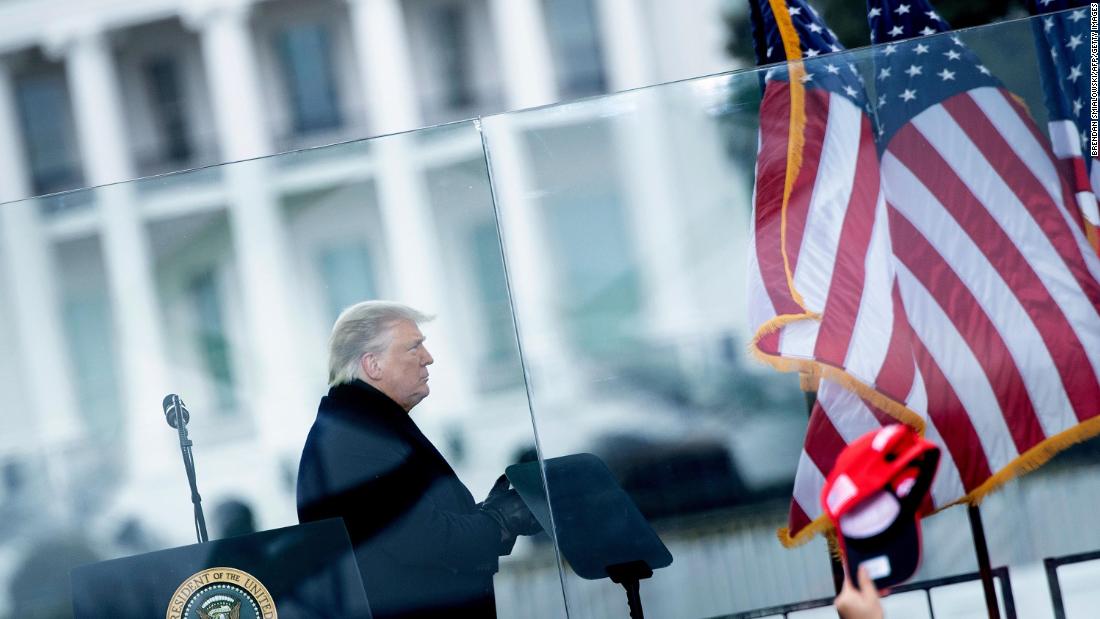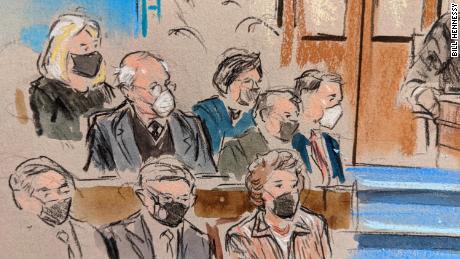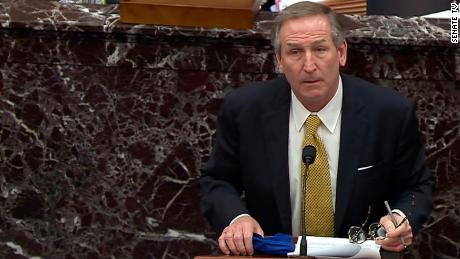And on the eve of Saturday’s vote on the single impeachment article that accuses Trump of inciting the insurrection, one of those House Republicans called on others to speak out.
The stunning details about Trump’s callous and unpresidential conduct struck at the heart of the question that senators have been weighing all week during the impeachment trial of the former President — whether he abdicated his duties as commander-in-chief by summoning a mob to Washington to challenge the November election results, and then failed to protect a co-equal branch of government as his followers stormed the Capitol.
For the Republican lawmakers who appear most likely to support convicting the former President, the question of what Trump did — or did not do — to protect his vice president as Mike Pence was being evacuated to a secure location has emerged as the central question of the impeachment proceeding, a failing so egregious that it could have power to sway members.
It is unclear whether the new details of the exchange between Trump and McCarthy will come up Saturday or sway any minds at this late juncture in the impeachment trial. The managers have not said whether they will call witnesses.
But the renewed focus on the McCarthy call, the existence and some details of which were first reported by Punchbowl News and discussed publicly by the California Republican, adds to the mounting evidence that the former President sided with rioters during terrifying moments when his followers were attacking Capitol Police and hunting for Pence, along with other Trump adversaries like House Speaker Nancy Pelosi.
A disturbing phone call
McCarthy, a Trump loyalist, had called the former President and pleaded for help, but was initially rebuffed by Trump, who at first tried to claim that his opponents like Antifa were to blame for the violence. McCarthy told Trump that was wrong, according to the new account of the call, which was confirmed to CNN by Herrera Beutler. Other Republican House members backed up her account.
“Well, Kevin, I guess these people are more upset about the election than you are,” Trump replied, according to the lawmakers’ account, which CNN’s Jamie Gangel, Kevin Liptak, Michael Warren and Marshall Cohen reported Friday.
McCarthy, incredulous, replied: “Who the f–k do you think you are talking to?” according to a Republican lawmaker familiar with the call.
Trump was furious with Pence that day, because his long-loyal vice president refused to accede to the former President’s demand that he overturn the election results — which Pence had no power to do. When Pence proceeded to the Capitol to preside over the certification of the votes, Trump used his rally on the Ellipse and his tweets to continue to whip up rage among his followers at Pence, falsely suggesting that the then-vice president had the power to change the election outcome.
At the trial this week, House impeachment managers have outlined Trump’s focus on political concerns as the riot was under way. As one piece of evidence, they noted that Trump spoke to newly elected Alabama Sen. Tommy Tuberville, a Republican, in the midst of the mayhem after rioters had breached the Capitol in an effort to get him to enlist other GOP lawmakers to object to the certification of the election results.
The Alabama senator revealed to Capitol Hill reporters this week that he told Trump during that phone call that authorities “just took the vice president out” and that he had to go — a clear warning to the then-President about the danger that Pence and lawmakers were facing from the mob. Yet, Trump still attacked Pence’s lack of “courage” in another tweet minutes later.
A burdensome question for GOP senators
Within all the voluminous evidence that has been presented this week, the mystery of why Trump would take a step that put Pence in greater danger — and what he knew about the level of violence that was taking place in the Capitol at a time when he did not deploy the forces at his command to help — has clearly been the one weighing most heavily on the key GOP senators who could vote for conviction.
After the defense rested their case on Friday and the two sides turned to questions from senators, Sens. Susan Collins of Maine and Lisa Murkowski of Alaska asked Trump’s lawyers to lay out what Trump knew and when he knew it, adding that they should be as “detailed as possible.”
Trump attorney Michael van der Veen had no answer to that question other than to point a 2:38 p.m. tweet that day by Trump — and immediately pivoted to blame Democratic House impeachment managers for the lack of clarity on the question, suggesting that they had failed to uncover those details in their investigation.
His response defied logic, given that Trump could have easily told his lawyers what happened that day or offered an explanation publicly about why it took so long for the White House to send help to the Capitol.
After Collins and Murkowski, Republican Sens. Mitt Romney of Utah and Bill Cassidy of Louisiana continued to press the Trump defense team on that question of Pence’s safety and the former President’s inaction. Romney asked whether Trump knew Pence was in danger when he criticized his vice president in a 2:24 p.m. tweet. (Van der Veen said “no” but did not offer any details to elucidate that answer).
Then answering a question from Cassidy — who underscored that Trump’s conversation with Tuberville is a key point in the timeline that seems to indicate Trump knew Pence was in danger — van der Veen seemed to dispute the notion that Trump called Tuberville at all. That was in spite of the fact that the call was confirmed by both Tuberville and Republican Utah Sen. Mike Lee, whose phone Trump called accidentally as he tried to reach the Alabama senator.
Van der Veen said “no,” but went on to dispute “the facts that are laid out in that question.”
“Unfortunately, we’re not going to know the answer to the facts in this proceeding because the House did nothing to investigate what went on,” van der Veen replied. He referred to the accounts of both Tuberville and Lee as “hearsay” and went on to assert that he was sure Trump “was concerned for the safety and well-being of Mr. Pence and everybody else that was over here.”
A Trumpian case
Lead impeachment manager Rep. Jamie Raskin, a Maryland Democrat, was clearly incensed by the repeated criticism of his team for failing to provide evidence of what the former President was doing on January 6. He noted that House members invited Trump to testify, but that he had refused to come to a civil proceeding to share what happened.
“He will not spend one day in jail if you convict him. This is not a criminal proceeding,” Raskin said. “This is about preserving the republic, dear Senate. That’s what this is about. Setting standards of conduct for the president of the United States so this never happens to us again.”
Raskin continued, “Bring your client up here and have him testify under oath about why he was sending out tweets denouncing the vice president of United States while the vice president was being hunted down by a mob that wanted to hang him and was chanting in this building ‘Hang Mike Pence!’ ‘Hang Mike Pence!’ ‘Traitor! Traitor! Traitor.'”
Van der Veen’s flippant response about Trump’s concern for Pence was in keeping with the argumentative demeanor that he increasingly adopted as the day went on.
It was also one of the many examples of how Trump’s team of lawyers barely mounted a defense for Trump’s inaction on January 6 or tried to resurrect the damage that has been done to the former President during the past three days in which the House impeachment managers laid out a devastating case showing how Trump marshaled his supporters and inflamed their fury by telling lies about the election results over several months.
Instead of rebutting the managers’ case, the defense team on Friday fashioned a presentation that was quintessentially Trumpian — lots of noise, distraction and irrelevant television clips of Democrats stating they would “fight” for legislation or various causes. Their main aim seemed to be pleasing Trump as he watched from his home in Mar-a-Lago, while distracting from the facts of what happened on January 6 and what senators themselves witnessed.
Trump’s lawyers claimed that the insurrection was not an insurrection, and that it was planned by radical extremists in advance — trying to argue that Trump bore no responsibility for the attack despite mountains of video evidence to the contrary. They claimed that the impeachment proceeding itself was an attack on free speech.
“You can’t incite what was already going to happen,” van der Veen said at one point, ignoring the fact that Trump had primed his supporters for months to fight back against what he falsely claimed was a rigged election.
The former President’s lawyers went so far as to repeat some of his lies about the election on the Senate floor, and tried to portray him as a paragon of “law and order,” who would never have approved of the attacks against the police that took place on January 6.
“The reality is, Mr. Trump was not in any way, shape or form instructing these people to fight or to use physical violence,” van der Veen said, defending Trump’s speech in Washington in the hours before the riot. “What he was instructing them to do was to challenge their opponents in primary elections, to push for sweeping election reforms, to hold big tech responsible, all customary and legal ways to petition your government for redress of grievances, which, of course, is also protected constitutional speech. But the House managers don’t want you to focus on those things, because, again, it does not fit their story.”
When they face their constituents at home, Republican senators who ultimately vote against conviction will be armed with some new arguments about how doing so would have jeopardized free speech, a key plank in the Trump team’s defense.
But the partisan nature of the questions from senators from both sides Friday suggested that few minds were changed during the impeachment process — and that most minds weren’t open to begin with.
“Let’s just be clear, President Trump summoned the mob, assembled the mob, lit the flame. Everything that followed was his doing,” Plaskett said. “And though he could have immediately and forcefully intervened to stop the violence. He didn’t.”





